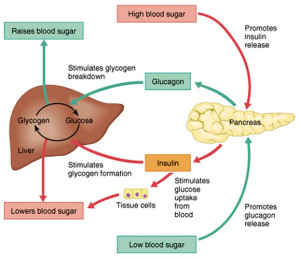 Insulin plays an important role when our body is trying to move food sources around to be processed, directly affecting our metabolism. Insulin is a hormone secreted by the pancreas, a small organ within our digestive tract. Whenever we have a rise in blood sugar and Amino Acids, our pancreas will secrete insulin. It is a message sender to the liver, muscles, and adipose tissue to uptake glucose (sugar in the bloodstream). Where it goes and how much is determined by what we ate.
Insulin plays an important role when our body is trying to move food sources around to be processed, directly affecting our metabolism. Insulin is a hormone secreted by the pancreas, a small organ within our digestive tract. Whenever we have a rise in blood sugar and Amino Acids, our pancreas will secrete insulin. It is a message sender to the liver, muscles, and adipose tissue to uptake glucose (sugar in the bloodstream). Where it goes and how much is determined by what we ate.
What insulin does do for us is it inhibits lypolosis, which is the breakdown of fat. Lypo=fat, olisis= breakdown. Then on the contrary stimulates fat synthesis, the build up of fat, telling the sugar where it needs to go to maintain balance. This is a crucial role in weight loss as it is a primary messenger of how to properly delegate sugar uptake. If we eat a lot of foods high in sugar, our pancreas begins to lose sensitivity and cannot accurately assess the sugar intake. This results in sugar remaining on our blood stream, hyperglycemia.
This is the early stage of type 2 Diabetes. There is a receptor that communicates from the sugar to the insulin to allow these two particles to combine. While we are exercising, this ‘middle man’ does not exist because the gateway for insulin to uptake sugar is open during exercise. A great way to naturally uptake sugar from the blood is to walk daily at a minimum. Other hormones that influence our metabolism are epinephrine, glucagon, cortisol, and growth hormone.
